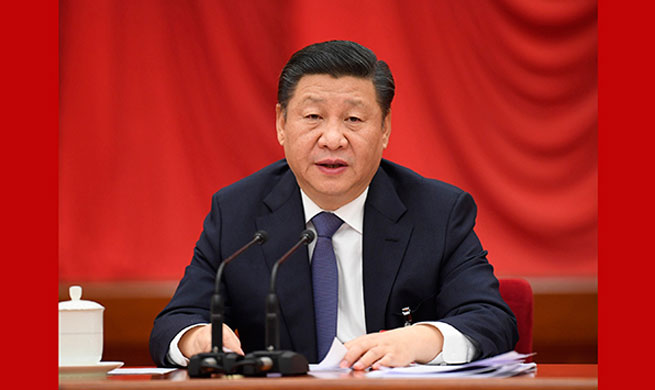BEIJING, Jan. 20 (Xinhua) -- As Hollywood blockbusters continue to hit the screens in China since the start of the year, a Russian space film has quietly entered cinemas and received immediate praise.
Released on the Chinese mainland on Jan. 12, "Salyut-7" tells the true story of two cosmonauts sent to investigate and repair the unmanned USSR station Salyut-7, which lost connection with ground control after nearly three years in service.
Despite underwhelming box office sales of 11.82 million yuan (1.85 million U.S. dollars) as of Friday due to limited screenings, the film was rated 7.7 on Chinese film rating platform Douban, higher than most other recently released movies.
Many of the over 13,000 users who left ratings compared the film with Hollywood space films, and commented on its unique value.
"The film was adapted from a historical event, which makes it different from sci-fi movies like 'Gravity,'" said Douban user "Zhangxiaobei," who was impressed by how the cosmonauts successfully worked with the simple technology available at that time.
Some viewers were shocked to find out the film's low production cost of around 400 million rubles (7 million U.S. dollars), while Hollywood space films such as "Gravity" and "The Martian" both cost more than 150 million U.S. dollars.
"Despite the low cost, its visual effects are on the same level as Hollywood," said user "Xuefengxixia," adding "Watching too many Hollywood space films can make us forget the true legacy of human adventures in space, so I'm very pleased to see cosmonauts from the USSR 'in action' on the screen."
Producer Zhao Jinbo praised the pace of the film's story, and how the mutual support shown by the two cosmonauts and their never-give-up attitude were portrayed in the film, which he thought echoes Chinese values.
As the latest Russian film to enter the Chinese mainland, "Salyut-7" is also one of the many non-Hollywood foreign films to hit Chinese cinemas in recent years, as the country attempts to expand its film sources to diversify the market.
Industry insiders said the film brings up the questions of how to improve the quality of Chinese sci-fi and space films, and how to enhance the international influence of Chinese films.
Director and producer Chen Guoxing believes the extreme popularity of overly commercial films in China has narrowed the viewing preferences of Chinese audiences, and decreased the motivation for directors to step out of the box and attempt new genres, such as sci-fi.
"Chinese sci-fis don't just need more money, good stories and the support of sci-tech institutes, but also directors who have positive energy and well defined aesthetic tastes," he said.
As for expanding the exports of Chinese films, he underscored the need for more attention to be placed on human nature.
"On one hand, our films should continue to promote Chinese culture and tell Chinese stories, with further efforts to enhance filming technology," Chen said.
"On the other hand, we should pay more attention to aspects of human nature, and try to innovate in the illustration of the universal value of humanity," he noted.
















